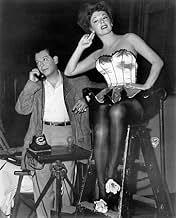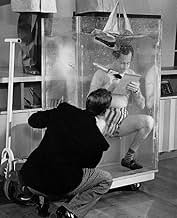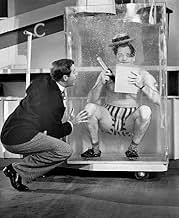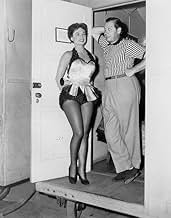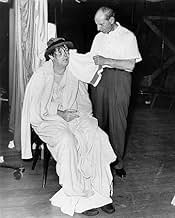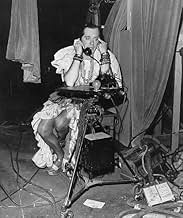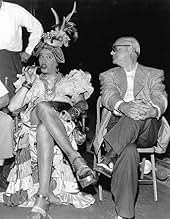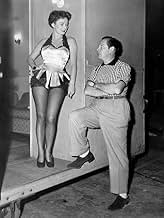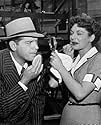IMDb-BEWERTUNG
5,6/10
518
IHRE BEWERTUNG
Füge eine Handlung in deiner Sprache hinzuA young comic plays second-rate nightclubs and chintzy resorts in his struggle to break into the big time.A young comic plays second-rate nightclubs and chintzy resorts in his struggle to break into the big time.A young comic plays second-rate nightclubs and chintzy resorts in his struggle to break into the big time.
Richard Avonde
- Minor Role
- (Nicht genannt)
Edward Biby
- Smoker
- (Nicht genannt)
Empfohlene Bewertungen
I happened upon this film by accident whilst I was channel surfing. Having never seen "Uncle Milty" in an acting role before I just had to stop and watch.
While this films story is one of those behind the scenes show biz stories of a comic trying to get into the big time, what I found to be absolutely fascinating was the character of Rene played by Iphigenie Castiglioni in what can only be read as a very, very lesbian night club owner for whom Berle auditions doing a comedic routine playing the piano and singing Miss Otis Regrets, a song written by the very gay Cole Porter.
The nightclub owner Rene with her mannish hairstyle, tuxedo (worn during the day!) and long, long cigarette holder with her aperitif is the quintessential gay stereotype for the era. How the combination of Rene in her garb and the suggestive Cole Porter song got past the censors is beyond me, but I am sure it was quite appreciated by gay audience members as an acknowledgment of their presence in show business.
While this films story is one of those behind the scenes show biz stories of a comic trying to get into the big time, what I found to be absolutely fascinating was the character of Rene played by Iphigenie Castiglioni in what can only be read as a very, very lesbian night club owner for whom Berle auditions doing a comedic routine playing the piano and singing Miss Otis Regrets, a song written by the very gay Cole Porter.
The nightclub owner Rene with her mannish hairstyle, tuxedo (worn during the day!) and long, long cigarette holder with her aperitif is the quintessential gay stereotype for the era. How the combination of Rene in her garb and the suggestive Cole Porter song got past the censors is beyond me, but I am sure it was quite appreciated by gay audience members as an acknowledgment of their presence in show business.
A small-time comic works his way up to the big time.
The two hours is mainly for fans of Uncle Miltie. Berle is in just about every scene, along with a number of his costumed skits. As expected, some skits are funnier than others; however, I wish this overlong movie had stayed on a light comedic level. Instead, it veers off near the end into heavy drama, which could have been easily lopped off.
Catch that bouncy opening—as I recall, it plays much like Berle's hit TV show that helped put TV on the map in the early days. Anyway, if guys get tired looking at the star, there's the delectable Ruth Roman standing around in various stages of undress, and also a shapely Virginia Mayo doing some surprisingly good dance steps. Comic actor Bert Lahr gets his turn on the stage. But to me, his brand of humor is a matter of taste.
I suspect Warner Bros. was testing the waters to see if Berle's appeal carried over to movies as well as TV, in the way it did for Bob Hope over at Paramount. However that may be, I think the movie would be better if shorter and strictly light-hearted.
The two hours is mainly for fans of Uncle Miltie. Berle is in just about every scene, along with a number of his costumed skits. As expected, some skits are funnier than others; however, I wish this overlong movie had stayed on a light comedic level. Instead, it veers off near the end into heavy drama, which could have been easily lopped off.
Catch that bouncy opening—as I recall, it plays much like Berle's hit TV show that helped put TV on the map in the early days. Anyway, if guys get tired looking at the star, there's the delectable Ruth Roman standing around in various stages of undress, and also a shapely Virginia Mayo doing some surprisingly good dance steps. Comic actor Bert Lahr gets his turn on the stage. But to me, his brand of humor is a matter of taste.
I suspect Warner Bros. was testing the waters to see if Berle's appeal carried over to movies as well as TV, in the way it did for Bob Hope over at Paramount. However that may be, I think the movie would be better if shorter and strictly light-hearted.
"Always Leave Them Laughing" is an interesting curio in many ways, but isn't a particularly good movie. Let me explain. When this film was made back in 1949, Milton Berle was the biggest name on television and much of his show's success was based on Berle doing t the sort of shtick he'd been doing for years in Vaudeville. So, here you get to see a semi-autobiographical film where Berle does a lot of the corny and over-the-top routines that made him famous. However, and this is VERY important, a lot of it just isn't funny. The jokes are so old and familiar that many viewers will recognize them and the rest fall pretty flat. Worst of all is the cop routine by Bert Lahr--that REALLY aged poorly. Yes, he was popular in the good old days but today this seemed very tired and cringe-worthy at times. Another thing that will make you cringe is seeing Berle do a third-rate Jolson routine--in black- face! Plus, Berle's character was, at times, really difficult to like.
Is it all bad? No. When Berle isn't trying to be funny he's pretty good. And, it's surprising to see how limber and graceful he is when he dances--and several of the dance numbers (particularly with Lahr) were nice. But this just isn't enough. The film is a window into a bygone era...one that just doesn't work or entertain in the 21st century.
Is it all bad? No. When Berle isn't trying to be funny he's pretty good. And, it's surprising to see how limber and graceful he is when he dances--and several of the dance numbers (particularly with Lahr) were nice. But this just isn't enough. The film is a window into a bygone era...one that just doesn't work or entertain in the 21st century.
My favorite comic will always be Uncle Miltie and he was a scream in this one. Hammy and corny beyond belief, this slapstick had me rolling on the floor. The story involved a up and coming third rate comic trying to break into big time show biz. He must first work second rate clubs and resorts, but finally gets his big shot when taking over a routine for a fellow actor. Lots of good hoofing, sight gags, and joking around in the famous Berle style.
Wusstest du schon
- WissenswertesThe "Fountain Pen Sketch" was taken from the hit musical "Make Mine Manhattan" that opened in New York on 15 January 1948 at the Broadhurst Theatre, 235 W. 44th St. and ran for 429 performances, and starred Sid Caesar. Max Showalter, who performs that specialty number in this movie, was also in that opening night cast playing the same role, as well as others.
- PatzerAfter Kip meets with Eagen, a brief clip is shown of a train heading to Boston, with a Southern Pacific locomotive. The Southern Pacific Railroad served California and the south west, and would not have gone to Boston or anywhere in the northeast.
- Zitate
Monte Wilson: [Checking out Kip's suit] Very conservative.
Kipling 'Kip' Cooper: Conservative? Why it could be elected on a Republican ticket without anyone in it.
- VerbindungenReferenced in Texaco Star Theatre Starring Milton Berle: Folge #2.11 (1949)
- SoundtracksAlways Leave Them Laughing
(1949) (uncredited)
Written by Sammy Cahn and Milton Berle
Sung during the opening credits and first scene by Lynn Davis, Lorraine Crawford,
Flo Farmer, Mary Castle, Alice Wallace and Nita Talbot
Reprised by them with Milton Berle at the end
Variations in the score throughout
Top-Auswahl
Melde dich zum Bewerten an und greife auf die Watchlist für personalisierte Empfehlungen zu.
Details
- Erscheinungsdatum
- Herkunftsland
- Sprache
- Auch bekannt als
- Always Leave Them Laughing
- Drehorte
- 1655 Broadway, Manhattan, New York City, New York, USA(Lindy's Restaurant, exterior)
- Produktionsfirma
- Weitere beteiligte Unternehmen bei IMDbPro anzeigen
- Laufzeit1 Stunde 56 Minuten
- Farbe
- Seitenverhältnis
- 1.37 : 1
Zu dieser Seite beitragen
Bearbeitung vorschlagen oder fehlenden Inhalt hinzufügen

Oberste Lücke
By what name was Tritt ab, wenn sie lachen (1949) officially released in India in English?
Antwort

